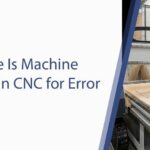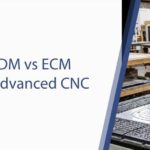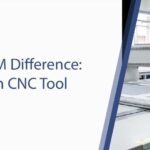Types of CNC Control Panels
CNC (Computer Numerical Control) systems play a crucial role in modern manufacturing by ensuring high precision, efficiency, and repeatability. The performance of CNC machines is directly linked to the processing power, communication capabilities, and integration capacity of the control panel used.
In this article, we will explore the different types of CNC control panels commonly used in the industry, their technological advantages, applications, and key features in detail.
Standalone CNC Control Panels
Standalone CNC control panels operate using embedded systems, eliminating the need for an external computer or additional devices. These systems are cost-effective, compact, and energy-efficient, making them ideal for small and medium-sized manufacturing environments. They are widely used in applications such as CNC routers, laser cutting machines, stone processing, and woodworking machines.
Technical Features:
- Embedded processor and firmware: The system does not require an external computer, as the control panel is equipped with an integrated processor.
- Industrial communication protocols: Supports Modbus, RS-485, CANopen, enabling seamless integration with external components.
- Easy installation and maintenance: Operates independently of external operating systems, allowing for user-friendly and quick setup.
Applications:
- Ideal for stone processing machines, woodworking machines, and small-scale manufacturing equipment.
Notable Models:
- Masso G3: A standalone control system with touchscreen support, commonly used in small and medium-sized machines.
PC-Based CNC Control Panels
PC-based CNC control systems offer high processing power and a scalable architecture, making them suitable for complex and multi-axis machining requirements. Thanks to their integration with CAD/CAM software, these control panels provide high-precision control for multi-axis machining centers, prototype manufacturing machines, and industrial production lines.
Technical Features:
- High processing power: Can integrate with advanced CAD/CAM software and digital simulation tools for precise machining.
- Modular architecture: Supports up to 5-axis interpolation and offers an expandable modular design.
- SCADA and ERP integration: Enables centralized management of production processes.
Applications:
- Suitable for industrial production lines, prototype machines, and multi-axis machining centers.
Notable Models:
- Mach4 + UC300ETH-5LPT: A highly modular system with multi-axis control capabilities, compatible with various machining centers.
- Centroid Acorn: Designed for industrial manufacturing and prototyping, featuring advanced control algorithms.
Industrial CNC Control Panels (PLC-Integrated Systems)
PLC-based CNC control systems are used in high-speed production lines and robotic system integration. These systems play a crucial role in smart factories, sensor networks, and robotic automation processes. They are fully compatible with Industry 4.0 and smart manufacturing, offering big data analytics and cloud computing support.
Technical Features:
- PLC integration: Provides centralized control, managing machines, sensors, and robots in a production line.
- Advanced communication protocols: Supports Ethernet/IP, Profinet, Modbus TCP/IP for seamless data transmission.
- Multi-axis control: Fully compatible with robotic production lines.
Applications:
- Suitable for automotive manufacturing, aerospace, robotic production lines, and smart factories.
Notable Models:
- Siemens Sinumerik 840D sl: Used in aerospace and automotive industries for high-precision machining.
- FANUC 31i-B: Offers robot integration and advanced machining capabilities.
Modular CNC Control Panels (Customizable Systems)
Modular CNC control systems offer flexible and scalable solutions tailored to various manufacturing needs. These systems are ideal for automation applications and mechatronics projects, as they allow for custom hardware and software configurations, making them applicable across multiple industries.
Technical Features:
- Customizable architecture: Can integrate external drivers, I/O modules, and servo systems.
- Compatible with multiple operating systems: Works with Linux, Windows, and other platforms.
- Expandable connectivity: Features Ethernet, USB, and RS-232 for enhanced communication.
Applications:
- Suitable for automation systems, mechatronics projects, and advanced manufacturing lines.
Notable Models:
- Texcomputer TNC 640: Provides flexible hardware support for high-performance machining centers.
- Fagor 8065 CNC: Features expandable architecture and high-speed tool path calculations.
Radonix PC-Based CNC Control Panels
Radonix specializes in PC-based CNC control solutions designed for industrial applications. These systems offer high processing power, expandable architecture, and flexible software integration, making them ideal for stone processing, woodworking machines, and medium-scale production lines. Radonix control panels incorporate touchscreen displays, advanced software features, and compatibility with standard PC components, offering more flexibility than traditional standalone systems.
Technical Features:
- PC-based architecture: Supports powerful processors and enhanced graphics for complex operations.
- Touchscreen support: Features integrated graphical interfaces for easy monitoring and control.
- Modular software: Customizable software solutions enable multi-axis control and industry-specific adaptations.
Applications:
- Ideal for medium-scale production lines, stone and woodworking machines, and multi-axis machining centers.
Notable Model:
- Radonix Smart 4A (PC-Based): A high-performance control panel widely used in stone and woodworking industries.
Conclusion
CNC control panels are essential tools for optimizing modern manufacturing processes, ensuring efficiency and precision. Standalone, PC-based, PLC-integrated, and modular systems provide suitable solutions for various industrial applications.
Advanced solutions like Radonix PC-based systems enhance productivity in the stone and woodworking industries, contributing to digital transformation in industrial manufacturing.
Choosing the right CNC control panel directly impacts efficiency, accuracy, and flexibility in production lines, enabling manufacturers to optimize their processes effectively.
Contact Us:
- E-Mail: info@radonix.com
- Phone: +90 (553) 920 5500











